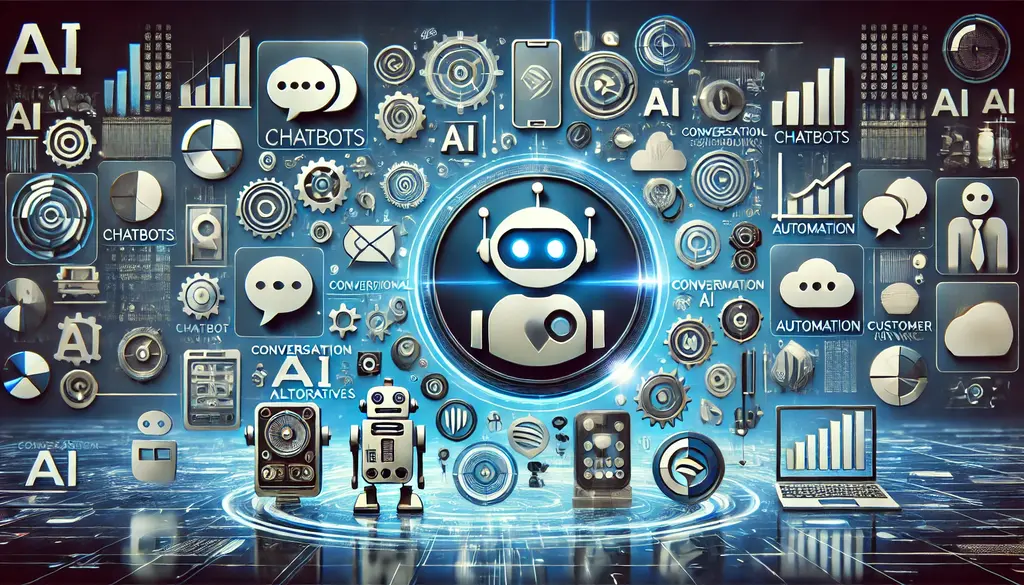The rapid growth of conversational AI has revolutionized customer support, streamlining how businesses interact with their clients. Replicant, a leader in this space, has garnered immense attention for its AI-powered customer service solutions. However, every business is unique, and finding the right platform tailored to your needs is essential.
Whether you’re looking for better pricing, advanced features, or more robust integrations, this comprehensive guide to the top Replicant alternatives for 2025 will help you make the best choice for your organization.
Why Look for Replicant Alternatives?
While Replicant provides robust conversational AI tools, there are compelling reasons to consider alternatives. Businesses often outgrow the limitations of a single platform and need solutions that better match their evolving requirements. Here are some reasons why exploring Replicant alternatives makes sense:
- Diverse Business Needs: Some businesses require platforms with greater scalability, while others prioritize simplicity for smaller teams.
- Cost Considerations: Replicant’s pricing may not suit every budget, prompting businesses to seek more cost-effective options.
- Feature Gaps: While Replicant is powerful, it may lack specific features like advanced integrations or industry-specific capabilities.
- Customizable Solutions: Companies may need tools that align more closely with their workflows and objectives.
By exploring alternatives, you can uncover platforms that deliver enhanced functionality, better support, and tailored solutions to meet your organization’s goals.
How to Choose the Right Conversational AI Platform?
Selecting a conversational AI platform is a critical decision that can shape your customer service strategy for years to come. Here are the factors to keep in mind:
- Ease of Use: The platform should be intuitive and easy to deploy, minimizing the learning curve for your team.
- AI Capabilities: Advanced AI features such as natural language processing (NLP), sentiment analysis, and machine learning should meet your business’s needs.
- Multichannel Support: Look for platforms that integrate seamlessly across various channels, including voice, chat, social media, and email.
- Integration Options: The ability to connect with CRMs, analytics tools, and other existing systems is crucial for streamlining operations.
- Scalability: Ensure the platform can grow alongside your business, handling increased volumes and complexity.
- Pricing Transparency: Transparent pricing models help you budget effectively without surprises.
- Customer Support: Responsive and helpful customer support is essential for troubleshooting and optimizing performance.
With these criteria in mind, let’s explore the top Replicant alternatives that could redefine your customer service strategy in 2025.
The Best Replicant Alternatives for 2025
We have selected some of the best Replicant alternatives businesses can use this year:
1. Bigly Sales
Bigly Sales is an innovative customer engagement platform designed for businesses that want to streamline sales and communication processes. While it is primarily a sales-centric platform, its features extend beyond traditional CRM tools by incorporating automation and omnichannel communication, making it a viable alternative to conversational AI platforms like Replicant.
Bigly Sales focuses on enhancing outreach and follow-ups through text messages, emails, and calls, offering automation and scheduling tools that save time and boost efficiency. What sets Bigly Sales apart is its affordability—ideal for small and medium-sized businesses that need advanced features without paying for expensive enterprise solutions.
Its intuitive interface and ability to integrate with existing workflows make Bigly Sales a strong contender for organizations looking to improve their customer engagement strategy. Though it may not have the full AI capabilities of platforms like Genesys Cloud or NICE CXone, its practical approach to sales and communication ensures businesses can achieve consistent and reliable customer service.
2. Salesforce Service Cloud
Salesforce Service Cloud is a robust customer service platform offering AI-driven insights and deep integration with Salesforce’s CRM. It enables businesses to deliver personalized support across all touchpoints.
From case management to automated workflows, Service Cloud offers everything needed to streamline customer service processes. While its advanced features come with a steeper learning curve, it remains a top choice for organizations seeking comprehensive solutions.
3. Freshdesk
Freshdesk is an affordable, cloud-based solution perfect for small and medium-sized businesses. It offers multichannel support, ticket management, and AI-driven chatbots to streamline customer interactions.
One of Freshdesk’s biggest strengths is its accessibility—it’s easy to set up and use. While its advanced features are limited to higher-tier plans, its affordability and simplicity make it a favorite among budget-conscious businesses.
4. Genesys Cloud CX
Genesys Cloud CX is a powerhouse in customer experience solutions, offering omnichannel routing, AI automation, and workforce optimization tools. It excels at managing complex customer journeys, making it ideal for larger enterprises.
While its features are impressive, Genesys Cloud CX can be cost-prohibitive for smaller organizations. However, its scalability ensures it remains a top choice for businesses focused on growth.
5. NICE CXone
NICE CXone combines AI, analytics, and automation to deliver exceptional customer experiences. Its comprehensive toolset includes virtual assistants, omnichannel support, and performance analytics.
This platform’s robust features make it a great fit for enterprises, although it may require technical expertise to implement fully. Businesses looking for a scalable, feature-rich solution will find NICE CXone an excellent choice.
6. Zendesk
Zendesk is a household name in customer support, offering a comprehensive platform for managing interactions across channels. Its AI-powered tools include chatbots, ticketing systems, and advanced reporting.
Zendesk’s flexibility makes it suitable for businesses of all sizes. However, its pricing can be a challenge for smaller teams, so it’s best suited for those with a reasonable budget.
7. Ada
Ada is an AI-powered chatbot platform designed for seamless automation. It delivers personalized, contextual responses, reducing the need for human intervention.
Ada’s natural language processing capabilities make it a standout choice for businesses seeking efficient and engaging customer interactions.
8. Dialpad
Dialpad leverages advanced AI to enhance customer communication. Its voice intelligence technology provides real-time transcription and sentiment analysis, making it a unique option for modern businesses.
Dialpad’s ability to integrate with existing systems ensures a smooth transition for organizations adopting AI-driven tools.
9. Talkdesk
Talkdesk is an AI-driven contact center platform that enhances customer engagement through automation and analytics. It’s known for its reliability, making it a popular choice among industries like healthcare, finance, and retail.
Its omnichannel support and real-time reporting features allow businesses to stay ahead of customer needs.
10. Gladly
Gladly focuses on building stronger customer relationships by consolidating communication into a single timeline. This personalized approach ensures consistency and improves the quality of interactions.
Businesses that prioritize customer retention and satisfaction will find Gladly’s features invaluable.
11. LivePerson
LivePerson specializes in conversational commerce, enabling businesses to engage with customers through AI-driven messaging. Its tools include chatbots, analytics, and automation workflows.
This platform is particularly well-suited for e-commerce businesses looking to boost conversions through personalized interactions.
12. Kore.ai
Kore.ai is a no-code conversational AI platform that allows businesses to create custom chatbots and virtual assistants. It supports several use cases, from customer support to HR automation. Its flexibility and ease of use make it an attractive option for businesses with unique needs.
13. Tidio
Tidio is an affordable chatbot platform designed for small businesses. Its simple interface and AI-driven features make it easy to set up and manage. While it lacks some advanced features, Tidio’s affordability and user-friendliness make it a great entry point for businesses new to AI.
14. Helpshift
Helpshift focuses on mobile-first customer support, offering AI-powered messaging and ticketing solutions. Its tools are designed to enhance app-based experiences, making it a favorite among mobile-centric businesses.
15. Yellow.ai
Yellow.ai offers a conversational AI platform that combines chatbots, voice bots, and human-like virtual assistants to enhance customer interactions. Known for its advanced natural language processing (NLP) and machine learning, Yellow.ai caters to businesses seeking to deliver personalized and efficient customer service.
Its omnichannel support and robust automation features make it a powerful tool for companies of all sizes, particularly those operating in multilingual markets.
16. Comm100
Comm100 is a customer communication platform designed to help businesses engage with customers through AI-powered chat, voice, and email support. It stands out for its easy-to-use interface and ability to efficiently manage high volumes of customer interactions.
Comm100 is particularly popular among small to medium-sized businesses looking for a cost-effective way to deliver excellent customer service.
17. WhosOn
WhosOn is a live chat software incorporating AI to improve customer engagement and support. Its standout feature is the ability to switch seamlessly between automated and human support, ensuring customers receive the best possible experience.
WhosOn’s focus on real-time customer engagement makes it a great choice for businesses prioritizing immediate support and resolution.
18. Pypestream
Pypestream specializes in conversational AI for large-scale automation. It offers industry-specific solutions tailored to sectors like finance, healthcare, and retail, helping businesses deliver contextual, personalized support.
Its AI-powered customer journey mapping and integration capabilities make it a top contender for enterprises seeking to optimize their workflows.
19. ChatBot.com
ChatBot.com provides a no-code platform for creating AI-powered chatbots. With its intuitive drag-and-drop interface, businesses can quickly set up conversational bots for customer support, sales, and lead generation.
While it’s a great solution for small to medium-sized businesses, its limited advanced features may require larger organizations to explore more comprehensive platforms.
20. Conversica
Conversica focuses on sales and marketing automation through AI-driven assistants. Unlike traditional customer service platforms, Conversica specializes in lead qualification, customer follow-ups, and revenue growth.
It’s particularly effective for businesses looking to enhance their sales processes while maintaining a personal touch with clients.
21. LiveChat
LiveChat is a customer service platform for real-time engagement with website visitors. Its integration with AI chatbots and ticketing systems makes it a versatile option for businesses that value instant communication.
LiveChat’s simplicity and extensive integration options make it a reliable choice for organizations of all sizes.
22. Verint
Verint offers a robust conversational AI platform emphasizing workforce engagement and customer experience. It uses AI to automate interactions across channels while providing insights into customer behavior.
Verint’s strengths lie in its advanced analytics and scalability, making it an excellent option for enterprises managing complex customer interactions.
23. Landbot
Landbot is a no-code chatbot builder that helps businesses create conversational experiences for websites, messaging apps, and more. Its intuitive interface allows users to design workflows tailored to specific customer needs.
Landbot is ideal for small businesses and startups looking to implement conversational AI without the need for extensive technical expertise.
24. Zoho Desk
Zoho Desk integrates conversational AI with traditional helpdesk features, making it a unique hybrid solution. Its AI assistant, Zia, can handle customer queries, generate insights, and automate routine tasks, freeing up human agents for more complex issues.
Zoho Desk’s affordability and seamless integration with the broader Zoho ecosystem make it a great choice for small to medium-sized businesses.
25. IBM Watson Assistant
IBM Watson Assistant is a leader in the AI space, offering powerful conversational AI solutions for businesses across industries. Its advanced NLP capabilities, customizable workflows, and integration options make it a highly versatile platform.
While its robust features cater primarily to enterprises, its scalability and flexibility ensure it can support businesses as they grow. IBM Watson Assistant is particularly well-suited for organizations seeking cutting-edge AI solutions.
Final Thoughts
Selecting the best conversational AI platform is not just about finding the most popular solution but identifying the one that aligns with your unique business needs. With these Replicant alternatives, you have a wide range of options, each offering distinct features, pricing structures, and advantages.
Whether you’re a startup seeking affordability and simplicity or an enterprise looking for advanced features and scalability, there’s a platform here that can elevate your customer service strategy. Remember, the right tool can improve customer satisfaction, boost operational efficiency, and drive business growth in 2025 and beyond.
Take the time to explore these alternatives, test their capabilities, and choose a platform that delivers exceptional customer experiences consistently.








